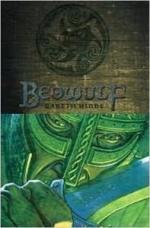War-famous
man, by deeds that were valiant,
He
lived in honor, beloved companions
35 Slew
not carousing; his mood was not cruel,
But
by hand-strength hugest of heroes then living
The
brave one retained the bountiful gift that
The
Lord had allowed him. Long was he wretched,
So
that sons of the Geatmen accounted him worthless,
40 And the
lord of the liegemen loth was to do him
Mickle
of honor, when mead-cups were passing;
They
fully believed him idle and sluggish,
{He is requited for the slights suffered in earlier days.}
An
indolent atheling: to the honor-blest man there
Came
requital for the cuts he had suffered.
45 The folk-troop’s
defender bade fetch to the building
The
heirloom of Hrethel, embellished with gold,
{Higelac overwhelms the conqueror with gifts.}
So
the brave one enjoined it; there was jewel no richer
In
the form of a weapon ’mong Geats of that era;
In
Beowulf’s keeping he placed it and gave him
50 Seven
of thousands, manor and lordship.
Common
to both was land ’mong the people,
[75] Estate and inherited rights and possessions,
To
the second one specially spacious dominions,
To
the one who was better. It afterward happened
55 In days
that followed, befell the battle-thanes,
{After Heardred’s death, Beowulf becomes king.}
After
Higelac’s death, and when Heardred was murdered
With
weapons of warfare ’neath well-covered targets,
When
valiant battlemen in victor-band sought him,
War-Scylfing
heroes harassed the nephew
60 Of Hereric
in battle. To Beowulf’s keeping
Turned
there in time extensive dominions:
{He rules the Geats fifty years.}
He
fittingly ruled them a fifty of winters
(He
a man-ruler wise was, manor-ward old) till
A
certain one ’gan, on gloom-darkening nights,
a
{The fire-drake.}
65 Dragon, to govern, who guarded a treasure, A high-rising stone-cliff, on heath that was grayish: A path ’neath it lay, unknown unto mortals. Some one of earthmen entered the mountain, The heathenish hoard laid hold of with ardor; 70 * * * * * * * * * * * * * * * * * * * * * * * * * * * * * * * * * * *
[1] This verse B. renders,
’Now serve I again thee alone as my
gracious king.’




